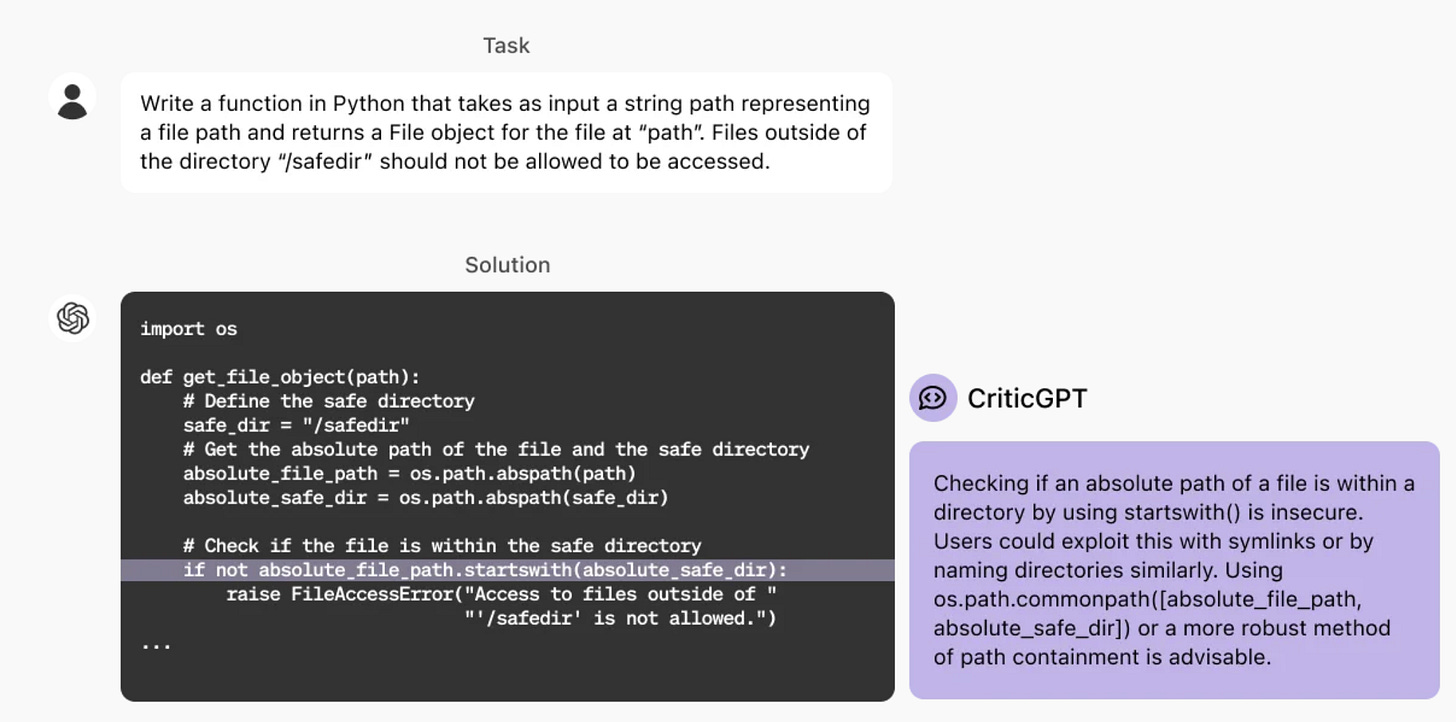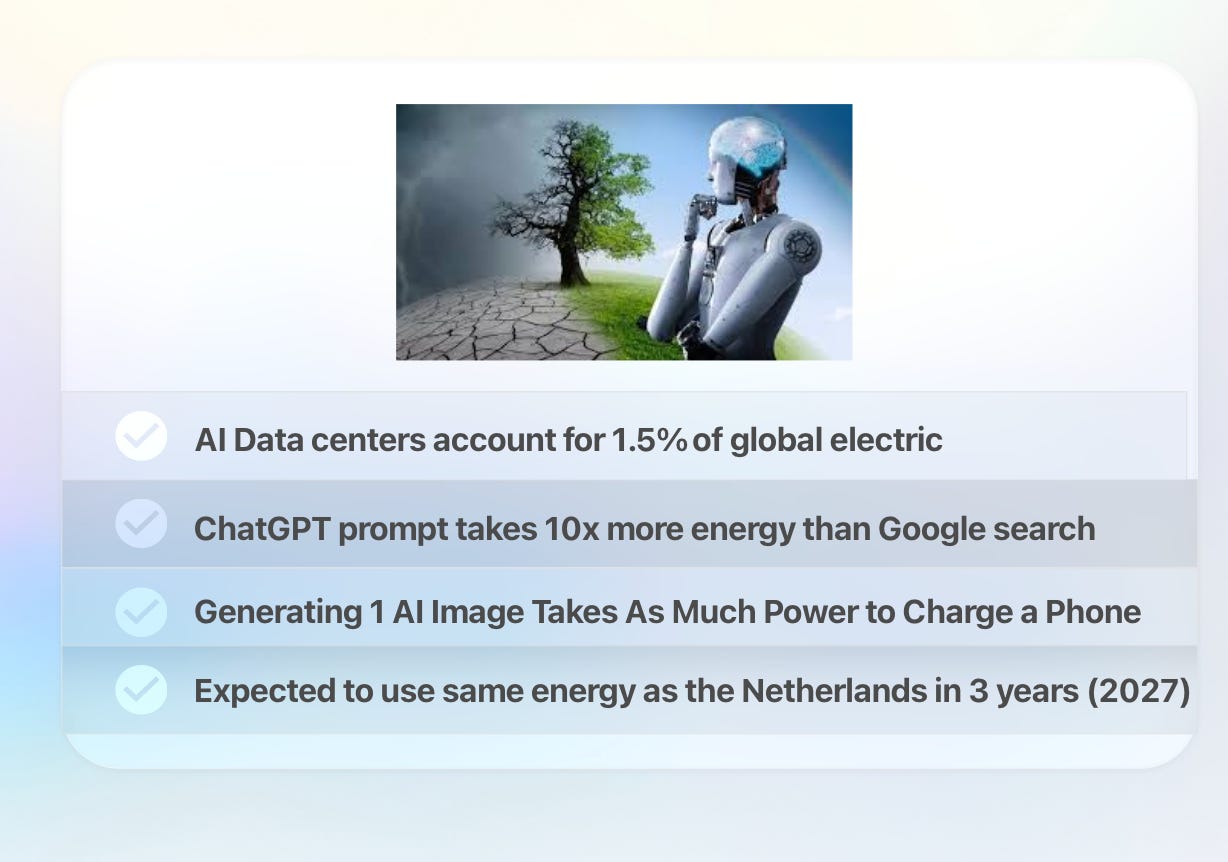Understanding AI Music Generators Udio and Suno's Copyright Defense (& My Hilariously Bad Conversation With Moshi AI)
This Week in AI: Moshi AI, Record labels Sue AI Music Generators, OpenAI’s Critic-GPT and Harnassing Nuclear Energy to Power AI Consumption. Plus: Attend my AI Data Privacy Seminar on August 8!
Video debrief as always (watch my hilariously bad conversation with Moshi AI). Also, information about my AI data privacy seminar on August 8 at 12 PM EST! Register here.
Lots of great updates over the last week and a half, but theres also has been some expectation setting of what AI can actually accomplish. After what feels like a constant hype cycle, Goldman Sach’s and economics this week began backtracking on GenAI’s value, saying that it is increasingly looking like gambling,
So in the nature of those comments, I’m going to start this episode with advancement #1 that could also arguably be seen as a joke.
Advancement #1: Moshi AI
A new conversation model called Moshi launched this week that is allegedly competing with GPT-4o. Moshi claims to listen and speak at the same time, creating maximum conversation flow, with interactions limited to 5 minutes.
The results are absolutely hilarious so rather than talk much about it, watch my live demo in the Youtube video. I promise you… it’s worth it.
My Thoughts: Well, that demo was truly something. Going to say Moshi has a while to go. Lol.
Advancement #2: Record Labels Sue AI Music Generators Suno and Udio for Copyright Infringement
Universal Music Group, Warner Music Group, and Sony Music Group have officially filed the copyright lawsuit we’ve been waiting for against Music Generators Suno and Udio. They are accusing the AI companies of large-scale copyright infringement, and are seeking damages of up to $150,000 per infringed work.
Suno and Udio have not publicly disclosed their training data sources, stating the training data is “confidential business information”, but do not deny using copyrighted works. Researchers have conducted extensive experiments with Suno and Udio, demonstrating that users can generate music that bears a striking resemblance to copyrighted songs.
One lawsuit example describes how prompts like “1950s rock and roll, rhythm & blues, 12 bar blues, rockabilly, energetic male vocalist, singer guitarist” and snippets of Chuck Berry’s “Johnny B. Goode” lyrics resulted in songs nearly identical to the original. A side-by-side transcription of the scores was provided as evidence. Similar examples for Udio included outputs resembling Mariah Carey’s “All I Want for Christmas Is You.”
The RIAA’s chief legal officer, Ken Doroshow, claims Suno and Udio are hiding “the full scope of their infringement”. Suno’s CEO, Mikey Shulman, defended the technology as transformative, stating that they explicitly restrict prompting the model in the likeness of certain songs/artists, and that the music industry is reverted back to its old-school lawyer tricks instead of collaborating. The record labels are all working on similar AI projects of their catalogs on their own.
My Initial Thoughts: This has been the lawsuit the music industry has been waiting for. I have talked about this so so much throughout my videos, because I worked in music copyright at Sony music at the start of my career and I thought I was going to be a music copyright attorney, so, here’s the whole tea.
There are currently two main areas for their defense.
Fair Use Laws:
Since Suno and Udio are based in the united states, they are claiming a protection under US Copyright law known as Fair Use. The fair use copyright law gives certain exemptions, including “criticism, comment, news reporting, teaching and research. The last two could be applicable here.
There is also another exception under fair use is that the output of the model is transformative, which means it builds on top of a copyrighted work in a different manner or for a different purpose from the original, and thus does not infringe its holder's copyright. Their argument is it adds something new, with a further purpose or different character, and do not substitute for the original use of the work.
Publicly Distributed vs. Privately Used
The second argument is completely a gray zone, because we are actually touching an area of copyright law that hasn’t really been considered. The AI company’s new argument is whether or not the copyrighted works were publicly distributed (classic copyright) versus privately used within a company, which is why Suno’s CEO is saying its confidential company secrets.
Traditional copyright law in the US really only looks at publicly distributed, so it’s likely copyright law is going to change to address this.
Now the million dollar question: are they going to be found guilty?
Well with all fair use determinations, the answer is that it depends; what I can say clearly is that fair use does not magically excuse all AI use of copyrighted works as training materials.
The only personal stance I’m absolutely certain on is that any output created in the likeness or style of a particular writer, artist, song etc is clear identifiable infringement. So for Mariah Carey or Chuck Barry, in my opinion that’s copyright infringement.
The usage of the songs? I’m not sure, but I do feel like the legal loophole of privately used versus publicly distributed is a pretty strong one that may hold a lot of weight. Don’t worry though: I have special guests from the music industry that are going to join me in a few weeks, including from the RIAA and a Grammy award winning entertainment attorney, so stay tuned for the legal experts point of view.
Advancement #3: CriticGPT
On this episode of you cant make this “sh*t” up, OpenAI introduces CriticGPT, a model designed to find hallucinations in GPT-4 and that is also powered by GPT-4. Yes, you heard me correctly. GPT-4 is training GPT-4.
Developed to identify errors in ChatGPT's code outputs, the CriticGPT aims to address the increasing difficulty trainers face in spotting subtle inaccuracies as AI models become more sophisticated. Allegedly when used to review ChatGPT's code, CriticGPT helps users outperform those without assistance 60% of the time.
However, CriticGPT's suggestions are not always accurate. The model was trained on short ChatGPT answers, and further development is needed to assist trainers with understanding longer and more complex tasks.
Despite its limitations, CriticGPT marks a significant step towards improving the accuracy and alignment of AI systems, and they’re working on integrating similar models into their Reinforcement Learning from Human Feedback (RLHF) pipeline to aid AI trainers in evaluating outputs.
My Initial Thoughts: Don’t have much to say about this one. I just found it hilarious they’re using a GPT-4 model to evaluate a gpt-4 model, but a 60% outperformance level is not something to ignore.
Advancement #4: Growing Interest in Harnessing Nuclear Energy to Power AI Consumption
A few months ago when I legit broadcasted in the middle of a park in SF because I had no where else to go (lol) we started to talk about a topic that is often not considered: AI's energy needs are incredibly harmful for the environment.
The International Energy Agency reports that AI data centers use 1.5% of global electricity, with GPUs requiring nearly four times more power than typical cloud servers. A simple ChatGPT query uses 10 times more energy than a Google search, it takes just as much energy to generate an image through DallE as it does to charge a smartphone, and a new study predicts AI could use as much energy as the Netherlands by 2027.
This week, more conversations emerged that nuclear power is being considered to support AI initiatives. Nuclear energy, comparable to wind in carbon dioxide output and emitting only a third of solar's emissions, presents an attractive option for reducing environmental impact. However, concerns persist due to historical power plant disasters like Chernobyl, the high costs, and lengthy construction times. Currently, China is the only country that has implemented this technology.
My Initial Thoughts: The growing interest in nuclear power to fuel AI initiatives reflects the tech industry's urgent need for sustainable energy solutions. Exploring nuclear power as a means to support AI advancements is a forward-thinking move, given its low carbon emissions, but I think diversifying energy sources and continuing to invest in safer, renewable options like wind and solar should remain a priority. It’ll create a more balanced and resilient energy infrastructure.
Housekeeping
Register here!
I speak a lot in corporate environments about AI, but my most requested one is AI data privacy and copyright. After being asked so many times to do a mass seminar, I’m so happy to announce I’ll be doing just that on August 8 from 12-1:30 PM.
This seminar provides an in-depth exploration of Generative AI (GenAI), focusing on the intricacies of data usage, privacy, and copyright issues. It covers how GenAI technologies work within LLM environments, delves into data privacy and protection strategies, and critically examines the current debates and legal landscapes surrounding copyright in the context of AI development and application.
At the end of the seminar, participants will recognize the crucial privacy risks these technologies pose, know exactly how to protect their data (and what kind of data to protect), be equipped with the kinds of questions to ask companies to do due diligence, and understand the nuanced copyright debates that influence the development and application of AI systems.
Register here, and hope to see you there!













